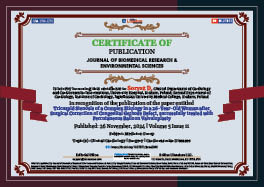Zydzik L, Gackowski A, Zajdel W, Olszanecka A, Wojciechowska W, Chyrchel B, Kielbasa G, Golinska-Grzybala K, Kapelak B, Bartus S6, Rajzer M and Sorysz D*
Volume5-Issue11
Dates: Received: 2024-11-13 | Accepted: 2024-11-23 | Published: 2024-11-26
Pages: 1516-1524
Abstract
Adults with Congenital Heart Disease (ACHD) are a constantly growing population that often presents significant challenges and requires a multidisciplinary approach. Therapeutic decisions must balance potential benefits and procedural risks, especially in young patients. Interventional cardiology offers treatments that may postpone cardiac surgery if the surgical long-term durability is doubtful. A particularly challenging group of patients includes those with rare defects or complex etiology, for which therapeutic standards have not been clearly established.
Tricuspid Stenosis (TS) is an uncommon valvular abnormality of acquired, congenital, or iatrogenic origin. Rarely, the etiology is multifactorial.
We present the case of a 26-year-old woman with a congenital gerbode defect, initially surgically corrected in childhood with subsequent surgery of residual ventricular septal defect. Mild TS was observed after surgery but it progressed to severe symptomatic TS after double pacemaker lead replacement and fusion of ventricular pacing lead with the tricuspid leaflets. Because of the complex etiology of valve disease, the diagnosis and treatment were challenging and required the use of multimodality imaging, with the pivotal role of advanced echocardiography. Due to age, high surgical risk, pacemaker dependency, small tricuspid annulus, and the prospect of further interventions in the future, the choice of treatment strategy was demanding and required an expert approach. The surgery was considered suboptimal as the durability of the tricuspid valve prosthesis was doubtful and could cause severe complications in a young woman. The patient was finally treated successfully with a Percutaneous Tricuspid Balloon Valvuloplasty (PTVB), an unusual procedure with only casuistic reports. PTVB improved symptoms and postponed surgery.
The case shows the importance of multimodality imaging and individualized treatment plans for ACHD. It highlights the need for specialized teams to improve the outcomes.
FullText HTML
FullText PDF
DOI: 10.37871/jbres2040
Certificate of Publication

Copyright
© 2024 Zydzik L, et al. Distributed under Creative Commons CC-BY 4.0
How to cite this article
Zydzik L, Gackowski A, Zajdel W, Olszanecka A, Wojciechowska W, Chyrchel B, Kielbasa G, Golinska-Grzybala K, Kapelak B, Bartus S, Rajzer M, Sorysz D. Tricuspid Stenosis of a Complex Etiology in a 26-Year-Old Woman after Surgical Correction of Congenital Gerbode Defect, successfully treated with Percutaneous Balloon Valvuloplasty. J Biomed Res Environ Sci. 2024 Nov 26; 5(11): 1516-1524. doi: 10.37871/jbres2040, Article ID: JBRES2040, Available at: https://www.jelsciences.com/articles/jbres2040.pdf
Subject area(s)
References
- Rao PS. Tricuspid stenosis: Diagnosis and management. Cardiology Clinics. 2018;36(1):155-166.
- Raza A. Tricuspid valve disease: A review. Cardiology Clinics. 2019;37(4):529-542.
- Rheude T. Histopathological findings in lead-related tricuspid stenosis. Heart Rhythm. 2018;15(3):456-462.
- Bäcker S. Lead-related tricuspid stenosis: A rare but significant complication in patients with pacemakers. Europace. 2018;20(6):1040-1045.
- Hahn R. Echocardiographic evaluation of tricuspid stenosis. Journal of the American Society of Echocardiography. 2019;32(10):1240-1252.
- Kouchoukos NT. Congenital Heart Surgery. Cardiac surgery: A complete guide. 1st ed. Elsevier; 2016.
- Murphy JG. Infective endocarditis in patients with prosthetic heart valves. Circulation. 2018;137(10):1005-1014.
- Alfieri O. Transcatheter interventions for tricuspid valve disease: State of the art. European Heart Journal. 2018;40(1):52-59.
- Wren C, Hunter S. Balloon dilatation of a stenosed bioprosthesis in the tricuspid valve position. Br Heart J. 1989 Jan;61(1):65-7. doi: 10.1136/hrt.61.1.65. PMID: 2917101; PMCID: PMC1216622.